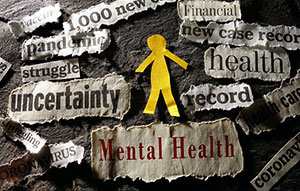News
Mental Health is Real
Date: 10/01/21
 Good mental health, like good physical health, is essential to human wellbeing. As the World Health Organization (WHO) puts it, "Mental health is an integral part of health; indeed, there is no health without mental health." And the mental health of employees is a critical element in the success of any organization.
Good mental health, like good physical health, is essential to human wellbeing. As the World Health Organization (WHO) puts it, "Mental health is an integral part of health; indeed, there is no health without mental health." And the mental health of employees is a critical element in the success of any organization.
How the COVID-19 pandemic has affected mental health
Initially, your fear may have been the stresses that came from working from home, isolation, fear for the safety of loved ones, and the pressures faced by health care workers and first responders. That has evolved into stress, anxiety, and fear of returning to the workplace, sending children back to school, and putting loved ones at risk through exposure to new variants of the virus. The Center for Disease Control and Prevention (CDC) found high rates of anxiety disorder (37 percent) and depression (30 percent) in the U.S. in data from weekly polls through the fall of 2020.
Prevalence of mental health issues
Half of all adults will experience a diagnosable mental health problem throughout their lives (one in five people) in any given year. Yet, unfortunately, fewer than half of people with diagnosable mental health problems receive treatment (many fewer in specific regions and countries, where mental health services are not as accessible, or there may be more stigma associated with seeking mental health).
The most common of these diagnosable mental health problems are depression and anxiety disorders:
- Pre-COVID-19 pandemic, depression was estimated to affect between 5 and 10 percent of the population at any one time, with an even higher prevalence in areas experiencing trauma from war or poverty.
- Pre-COVID-19 pandemic anxiety disorders, which include panic disorder, obsessive-compulsive disorder (OCD), post-traumatic stress disorder (PTSD), generalized anxiety disorder (GAD), and phobias, were estimated to affect between 4 and 19 percent of the population at any one time.
- Suicidal behaviors, including suicidal ideation, planning, and attempts, affect roughly 4 to 6 percent of the people in any given year (with some studies showing higher estimates).
All mental health issues can negatively affect a person's ability to function. Your EAP can help you with stress, grief, loss, trauma, substance abuse, and much more. In addition, we've helped people through the other traumas that have occurred on top of the pandemic—natural disasters, acts of violence, the focus on racial trauma. But, unfortunately, all of that fear, grief, stress, and trauma have compounded the strain on people's mental health. You are not alone. Call your EAP program today. Employee Assistance Programs (EAP) offer support to employees struggling with personal and work-related problems. We are available 24/7, and this program is available to you and those in your household free of charge.
SOURCES: WHO, CDC, NAMI
This information is not intended as a substitute for professional medical care. Please always follow your healthcare provider's instructions. Programs and services are subject to change. Managed Health Network, LLC (MHN) is a subsidiary of Health Net, LLC. The MHN companies include Managed Health Network and MHN Services, LLC. Health Net and Managed Health Network are registered service marks of Health Net, LLC or its affiliates. All rights reserved.
.jpg)
